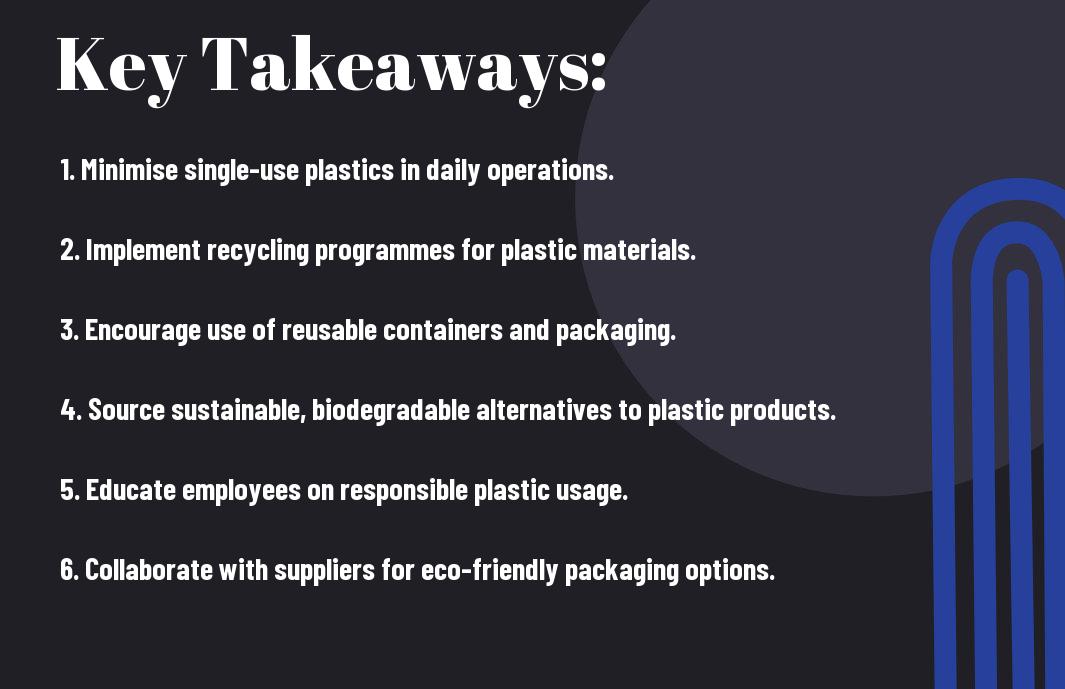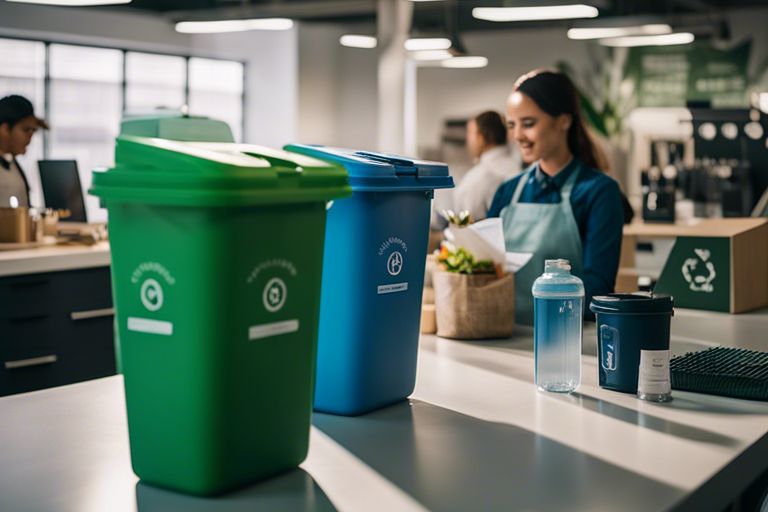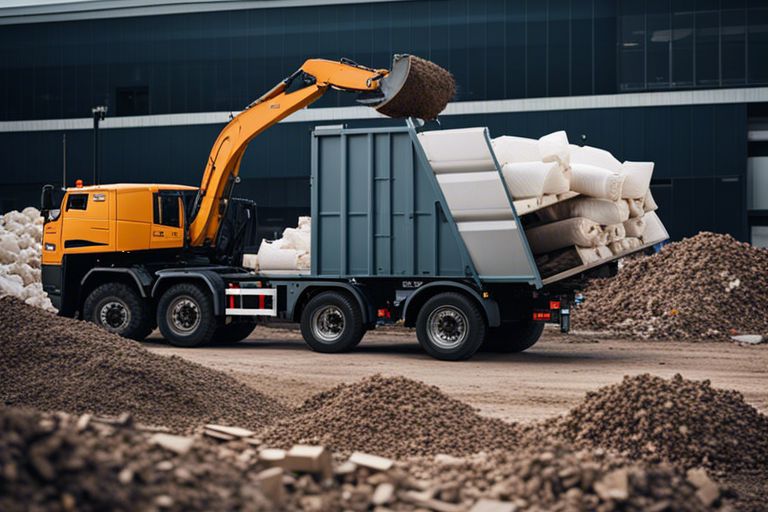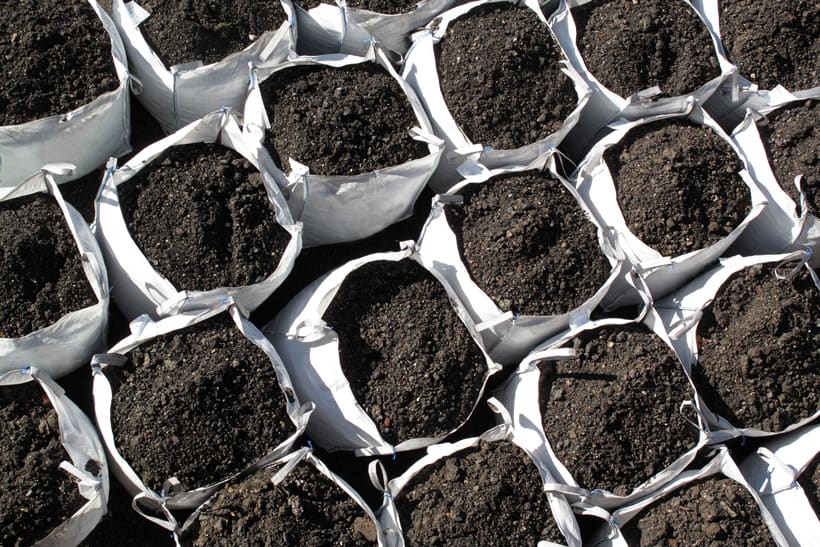Amidst the growing concern about the environmental impact of plastic waste, it is imperative for businesses to adopt effective strategies to reduce their plastic footprint. The statistics are alarming – with over 8 million tonnes of plastic ending up in the ocean each year, causing irreversible damage to marine life and ecosystems. Therefore, it is crucial for businesses to take proactive measures to address this issue. In this blog post, we will discuss some of the most impactful and practical strategies that your business can implement to minimise plastic waste, ultimately contributing to a healthier planet and a more sustainable future.
Key Takeaways:
- Collaborate: Partner with suppliers and clients to find sustainable alternatives to plastic packaging.
- Educate: Inform employees and customers about the importance of reducing plastic waste and provide them with practical tips to do so.
- Innovate: Invest in research and development to create and implement eco-friendly packaging solutions within your business operations.

Understanding Plastic Waste in Business
Plastic waste in business refers to the discarded plastic materials that result from the operations of a company. This waste can come from various sources such as packaging, products, or equipment used in the daily operations of the business. Understanding the different types of plastic waste generated is crucial in devising effective strategies for reducing and managing this waste.
Types of Plastic Waste Generated
There are different types of plastic waste that are commonly generated in a business setting. These include single-use plastics such as packaging materials, broken or outdated equipment made of plastic, plastic scrap from production processes, and office supplies such as pens and folders. Any business operation that involves the use of plastic materials is likely to generate some form of plastic waste.
| Type of Plastic Waste | Description |
|---|---|
| Single-use plastics | Plastic packaging materials used for products or shipping |
| Broken or outdated equipment | Plastic machinery or tools that are no longer functional |
| Plastic scrap from production processes | Leftover plastic materials from manufacturing or assembly |
| Office supplies | Everyday plastic items used in the office environment |
The Environmental and Economic Impact
The accumulation of plastic waste in the environment has severe consequences for ecosystems and wildlife. Plastic pollution can lead to habitat destruction, injury to marine life, and contamination of soil and water sources. In addition to the environmental cost, businesses also face economic implications from plastic waste management, such as increased disposal costs and the potential for reputation damage due to unsustainable practices.
Businesses that fail to address their plastic waste footprint may find themselves at a competitive disadvantage as consumers and investors increasingly value environmental responsibility and sustainable business practices. It is therefore essential for businesses to not only understand the environmental and economic impact of plastic waste but also take proactive measures to reduce their plastic footprint.
Developing a Plastic Waste Reduction Plan
Reducing plastic waste in your business requires a well-thought-out plan. Developing a plastic waste reduction plan involves several important steps to ensure the success of your efforts. To help you get started, here are some effective strategies for developing a comprehensive plan to reduce plastic waste in your business.
For more detailed information on how to build a winning business and reduce plastic footprint, check out How to reduce your business’s plastic footprint – Journey to Zero.
Conducting a Plastic Waste Audit
Before you can effectively reduce plastic waste in your business, it’s essential to conduct a thorough plastic waste audit. This involves assessing the types and amounts of plastic waste generated by your business, as well as identifying the key areas where plastic usage can be minimised. By conducting a plastic waste audit, you can gain a better understanding of the scale of the problem and identify specific areas for improvement.
Setting Realistic Reduction Goals
Setting realistic reduction goals is crucial for the success of your plastic waste reduction plan. It’s important to set achievable targets for reducing plastic usage and waste generation within your business. These goals should be specific, measurable, achievable, relevant, and time-bound (SMART). By setting realistic reduction goals, you can effectively track your progress and ensure that your efforts are making a significant impact.
When setting reduction goals, consider using keywords such as ‘plastic waste reduction’, ‘sustainable business practices’, and ‘environmental conservation’ to emphasise the importance of your objectives.

Effective Waste Reduction Strategies
Reducing plastic waste in your business is a crucial step towards a more sustainable future. Implementing effective waste reduction strategies can not only benefit the environment but also improve your company’s reputation and bottom line. To learn more about how businesses can reduce plastic use and improve their plastic footprint, visit How Can Businesses Reduce Plastic Use and Improve…
Alternatives to Single-Use Plastics
One of the most effective strategies for reducing plastic waste in your business is to seek alternatives to single-use plastics. This could include using biodegradable or compostable materials, promoting the use of reusable containers and packaging, or exploring innovative packaging solutions.
Implementing Recycling Programs
Implementing recycling programs within your business can significantly reduce the amount of plastic waste sent to landfill. Providing designated recycling bins, educating employees about proper disposal methods, and partnering with local recycling facilities are all essential steps towards effective waste management.
By implementing recycling programs, businesses can actively contribute to a circular economy and reduce their environmental impact.
Enhancing Supplier and Customer Engagement
Engaging with suppliers and customers to encourage the use of sustainable packaging and reduce plastic waste can have a significant impact. Collaborating with suppliers to source eco-friendly materials and educating customers about the benefits of reducing plastic consumption can create a positive ripple effect throughout the supply chain.
Effective engagement can lead to long-term partnerships and a shared commitment to sustainability, driving positive change within and beyond your business.
Employee Education and Incentives
Employee education and incentives play a crucial role in creating a culture of sustainability within your business. By providing training on waste management and offering incentives for environmentally friendly practices, you can empower your workforce to actively participate in reducing plastic waste and promoting responsible consumption.
Innovations in Packaging and Product Design
Embracing innovations in packaging and product design can significantly contribute to reducing plastic waste. Exploring alternative materials, redesigning packaging to minimise waste, and incorporating sustainable design principles can lead to more eco-friendly products and packaging solutions.
By staying abreast of industry innovations, businesses can lead the way in sustainable packaging and product design, setting new standards for environmental responsibility.
Policy and Regulation Considerations
Considering the impact of policies and regulations on plastic waste management is fundamental for businesses. Staying informed about relevant legislation, advocating for responsible policies, and complying with environmental regulations are essential steps in creating a sustainable and ethical business environment.
Businesses must navigate policy and regulation considerations to ensure compliance and contribute to a sustainable future.
Monitoring Progress and Making Improvements
As you work towards reducing plastic waste in your business, it is essential to monitor your progress and make continuous improvements. This will help you stay on track and identify areas where further action is needed to achieve your sustainability goals.
Measuring Reductions in Plastic Waste
One effective way to monitor progress is by regularly measuring the reductions in plastic waste generated by your business. Keep track of the amount of plastic waste produced, recycled, and disposed of, and compare these figures over time. This will give you a clear indication of how your efforts are impacting the overall reduction of plastic waste.
Adjusting Strategies as Needed
It is important to remain flexible and ready to adjust your strategies as needed. If you find that certain initiatives are not yielding the desired results of reducing plastic waste, be prepared to modify or replace them with more effective alternatives. This could involve seeking new suppliers, implementing additional recycling programmes, or exploring innovative packaging solutions.
By regularly reviewing your strategies and making necessary adjustments, you can ensure that your business remains on track towards reducing plastic waste and contributing to a more sustainable future. This proactive approach will also demonstrate your commitment to environmental responsibility to your stakeholders and customers.

Effective Strategies for Reducing Plastic Waste in Your Business
In conclusion, implementing effective strategies to reduce plastic waste in your business is crucial for environmental sustainability and long-term cost savings. By following the 10 Ways Small Businesses Can Reduce Plastics as outlined by Eco-Coach, businesses can make a significant impact in reducing their plastic footprint. Embracing alternatives such as biodegradable packaging, recycling programmes, and encouraging the use of reusable products among employees and customers, can result in a greener and more responsible approach to business operations. It is imperative for businesses to adopt a proactive stance in reducing plastic waste and contribute to a healthier planet for future generations.
10 Ways Small Businesses Can Reduce Plastics
FAQ
Q: What are effective strategies for reducing plastic waste in my business?
A: Implementing reusable and recyclable packaging, encouraging customers to bring their own containers or bags, and partnering with sustainable suppliers are all effective strategies for reducing plastic waste in your business.
Q: How can I encourage my employees to reduce plastic waste?
A: You can conduct training sessions on the importance of reducing plastic waste, provide them with reusable water bottles and coffee cups, and offer incentives for using sustainable alternatives to plastic.
Q: What are the benefits of reducing plastic waste in my business?
A: By reducing plastic waste, your business can save money on packaging materials, enhance its reputation as a sustainable and environmentally responsible company, and contribute to the preservation of the environment for future generations.
Q: Are there any regulations or laws regarding plastic waste reduction in businesses?
A: Yes, many countries and regions have implemented regulations and laws to reduce plastic waste, such as banning single-use plastics or requiring businesses to meet certain recycling targets. It is important to stay informed about these regulations and comply with them to avoid penalties and contribute to environmental conservation.
Q: How can I measure the impact of my efforts in reducing plastic waste?
A: You can measure the reduction in the use of plastic packaging materials, track the amount of plastic waste being recycled, and conduct surveys to gauge customer and employee satisfaction with your sustainability efforts. Additionally, you can collaborate with environmental organisations or experts to assess the overall environmental impact of your initiatives.







